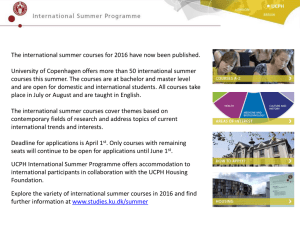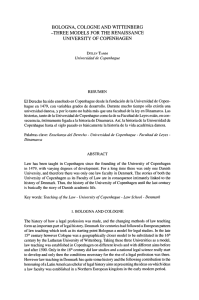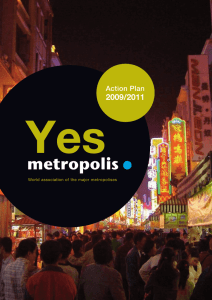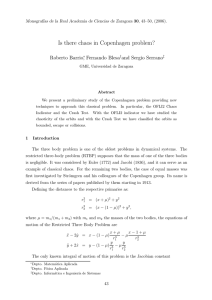a metropolis for people
Anuncio
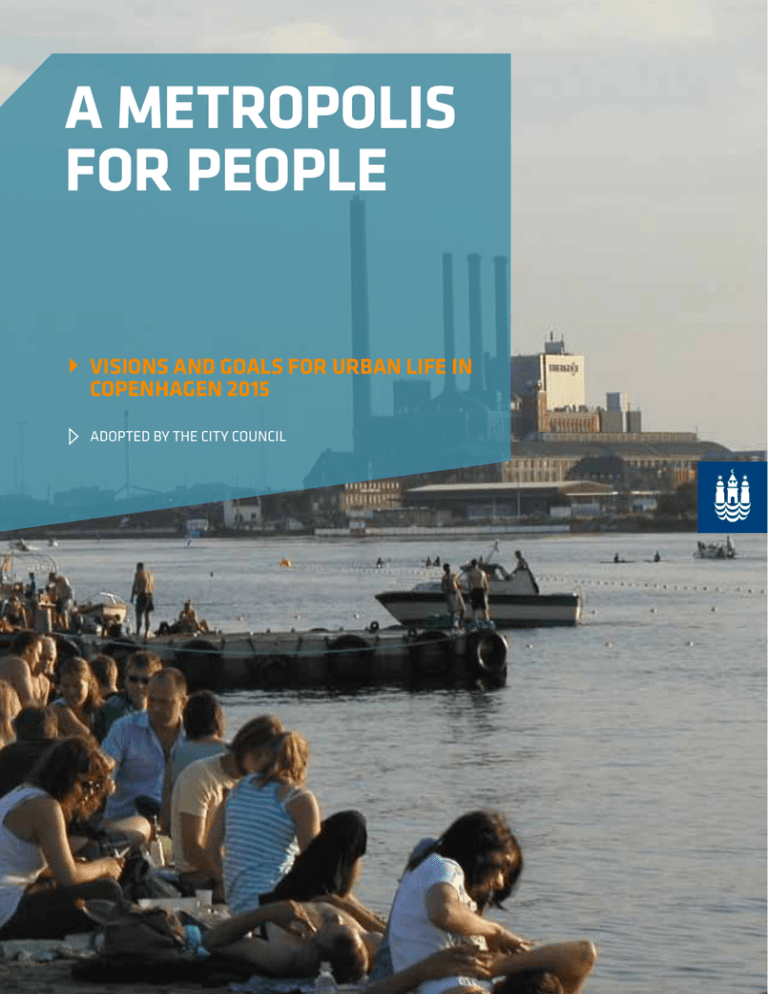
A metropolis for people Visions and goals for urban life in Copenhagen 2015 Adopted by the City Council 2 A metropolis for people Copenhagen has a vision We will become the world’s most liveable city: a sustainable city with urban space inviting people to a unique and varied urban life. We will become a metropolis for people. 3 LIVING IN THE CITY and taking part in its life is an active choice for most people. We go down to the café, cycle to work, take a dip in the harbour or go to a concert on one of the city squares. We can do these things because Copenhagen has a unique big-city environment with green areas, a clean harbour and a world famous cycling culture. In the city’s space we meet other people: both those we know already and those we just see down on the street, people with other values and other lifestyles. So, a varied urban life is an important part of a socially sustainable life. We will create urban space which invites people to an urban life. We know that urban life arises if people feel safe, if it is clean, there is something to sit on and something to look at. We know it is good for urban life when there is a mix of homes, culture, work place and shops. We know that Copenhagen already has some of the world’s premium urban space but we can and must be even better, both when we make changes in the city we already know and when it is a matter of new builds. This is why, with this initiative we will be setting concrete goals for urban life. This will be our starting point in our dialogues with landlords, planners, architects, landscape architects, local committees and all the city’s citizens and users. Together, we will create the best framework for a metropolis for people. THE WORLD’S BEST CITY In 2008, the British magazine “Monocle” crowned Copenhagen number one in the list of “The World’s Top 25 Most Liveable Cities.” The magazine highlights, amongst other characteristics, the scale of the city, its architecture, the clean harbour, the effectiveness of its transport system and bicycles. 4 Urban Life is people Public life is having a good time MORE AND MORE URBAN LIFE For the last 40 years, researchers from The Royal Danish Academy of Fine Arts School of Architecture have been documenting Copenhagen’s urban life. During the last decade, urban life has grown at the weekend and at night throughout the whole year. This has occurred not only in the centre of the city, but also in the inner suburbs. Urban life is not only café life and tourists. Urban life is what happens when people walk around and hang out in public space. Urban life happens on the squares, on streets and in parks, on playgrounds or on a cycle trip through the city. NEW COPENHAGENERS Urban life is: Compared to twenty years ago, there are 40% fewer old people and 40% more young people. Almost 20% of the city’s population has a nonDanish ethnic background. At the same time, the population of Copenhagen has increased by almost 40,000. Experience, expression, movement Public life is playing as well as people meeting Public life the year round Public life is recreation 5 Public life is everyday life URBAN LIFE IS GOOD FOR EVERY BODY Copenhagen has a vision of being the world’s eco-metropolis by 2015. The environment and urban life are, in many respects, two sides of the same coin. The fact that more Copenhageners take their bikes instead of their cars is good for urban life, their health and the environment. More green and blue areas and a clean and healthy environment invite people to take part in urban life. A varied urban life gives us an advantage in the competition with other large cities. It attracts tourists, creative people and firms. It creates economic growth as well as painting a positive picture of both the city and business and cultural life. Last but by no means least, a varied urban life is an important part of a socially sustainable city. We meet other people in the city’s common spaces. A short chat on a bench or just eye contact …these are what give us quality of life and increase our tolerance and understanding of each other. Public life is for all WE WANT TO MEASURE URBAN LIFE Copenhagen is going to set ambitious goals for urban life and initiate the relevant actions. When we start up bigger urban space projects we will measure urban life before and after. How many people hang out on the square before the project and how many after? Are there more or better facilities for holding events and activities? Measuring is of course one thing, but how do you experience life in the city? We will interview people who go around in the city on a daily basis to evaluate our work and to learn more about our challenges Public life is walking Public life is on the sea 6 Our goals for urban life The course set and the demands made in our work with urban life will be governed by our three major goals 7 MORE URBAN LIFE FOR ALL When we talk about a metropolis for people we mean a city for all. Copenhagen will have a varied urban life offering everybody the opportunity to participate irrespective of age, social status, ethnic background, finances or handicap. We will prioritize daily urban life highly while at the same time creating the possibility for the secret, the eccentric and the temporary to flourish. For these reasons, we will create more urban life for everybody with a variety of urban space and activities twenty-four hours a day all the year round. Our goal is: By 2015, 80% of Copenhageners will be satisfied with the opportunities they have for taking part in urban life. MORE PEOPLE TO WALK MORE A metropolis for people is a great city to walk in. Walking is our most basic form of movement. It is easy, healthy, sustainable and costs nothing to walk instead of taking the car. It offers us the opportunity to use our senses, to go on a voyage of discovery and to meet other people. Walking is urban life. So, Copenhagen invites you to walk – in greater comfort and safety and more easily able to get from A to B. Our goal is: To increase the amount of pedestrian traffic by 20% by 2015 compared to today MORE PEOPLE TO STAY LONGER Some urban life is governed by necessity. We have to do the shopping, fetch the children, go to and from work irrespective of how the city is laid out and equipped. All the fun things, recreational life in the city, the experiences and our personal enjoyment and expressions will only happen if it is a pleasurable place to be. For this reason, we will create squares, parks, streets and waterside quays which invite more people to stay there longer - both in the city centre, in new urban areas as well as where we live and go around on a daily basis. Our goal is: By 2015, Copenhageners will spend 20% more time in urban space than they do today. 8 THE CITY AS STAGE Every year, Copenhagen hosts countless large and small open air events. In July more than 200,000 people attend concerts at the Copenhagen Jazz Festival, Copenhagen Pride, open air film shows, football matches for the homeless, culture festivals, the DHL relay race to name but a very few. We intend to work with Malmø and the Øresund Region to develop even more arrangements and events so that we become the Nordic centre for large outdoor events. We will make it easy for small organizers to arrange little, local events throughout the whole city. There will be something here for every taste: children, young people, older people and those in between! MOCCA AND MARKETS Having a cup of coffee in a café outside has become part of modern big-city life, everywhere and all the year round. There must be more of this but we have to work together to make sure the esthetic and environmental aspects are taken into consideration appropriately. We will say yes, find solutions and give a helping hand. The organizers of course, also must take their share of the responsibility for cleaning up and leaving our common urban space as they would like to find it. People have always been shopping and trading in urban space and markets are more popular than ever now. We will work towards ensuring that Copenhagen has more markets and stalls with a new range of goods on offer. More urban life for all Our initiatives A city for play and movement Canoe polo, street basketball, a marathon and tai chi: the possibilities are endless when it comes to using the city for games and physical recreation and development. It is urban life and it contributes to Copenhageners’ daily wellbeing and health as well as offering experiences and meetings between people. For these reasons, Copenhagen will invite everyone to play more and to move more with for example, more flexible and robust urban space for ball games, skaters and skating rinks, easy access to clean bathing water and sailing, and green areas with a network of paths for walking and running. This will be to the advantage of clubs, unorganised and impromptu sporting activities as well as large sporting events. We will renovate all public playgrounds so they are even better. We will have playgrounds which strengthen children’s motor functions, development and imagination. Notices from the past like ‘Ball Games Prohibited in the Yard’ will be replaced by a wide range of opportunities to get the adrenalin pumping and have some fun in the city’s space. A CITY FOR ALL At some point in our lives we all need the city to be designed and equipped so that it is easy to get around in. Using a wheelchair, pushing a pram, walking around with the help of a rollator or a white stick or getting around on crutches puts special demands on the way urban space is designed and equipped. We will be including accessibility in all our projects and linking the city together with “City for all-links.” Of course, we will design a city where everyone can take part in urban life. Read more on www.kk.dk/legeplads Read more on www.kk.dk/byforalle 9 10 More people to walk more Our initiatives MORE ACTIVITY IN MAIN SHOPPING STREETS Every time we renovate urban space we will improve pedestrian conditions. The main shopping streets Nørrebrogade, Amagerbrogade, Vesterbrogade and Østerbrogade as well as other important streets plus the traffic node of Nørreport are all on the point of major changes. When this happens, attention will be focused on pedestrians WALKING AND CYCLING THROUGH THE CITY We will develop the network of links and promenades in the city so that they become safe and enjoyable routes both for pedestrians and cyclists. As part of our greening strategy we will plant 3,000 more trees along the streets and green links. In this way it will become possible to get from A to B and remain constantly in touch with a green environment. 11 A strategy for pedestrian traffic To pursue our goal “ More people to walk more” we are proposing a concrete strategy for pedestrians: a strategy to ensure we can invite Copenhageners to walk more in their city, with better accessibility, safety and comfort. This will apply whether we are going to work, to the baker’s or going for a Sunday stroll. A good walking environment is a precondition for the successful functioning of all other forms of transport. As everybody knows, all journeys begin and end on foot. A pedestrian account, with concrete traffic counts and enquiries into Copenhageners’ opinions will follow up on us achieving our goals. 12 POCKET-PARKS, TREES AND OTHER GREEN AREAS Green and blue areas frame a lot of urban life. For this reason we have developed a strategy to develop green areas in Copenhagen, “Pocket-parks, trees and other green areas.” We will create pocket-parks, especially in those city districts where there is a lack of green areas. Pocket-parks are small green areas in the middle of a crowded city. They are local meeting places, a fertile little oasis with room to hang out and play. URBAN SPACE SHOULD INVITE PEOPLE TO URBAN LIFE Copenhagen should have urban space which invites people to spend some time there – and we know what it takes. We will create green links through the city as well as better parks. We will be doing this partly when new city districts are built, like Nordhavn and Carlsberg, and partly when we develop and maintain already existing parks so that they meet modern big city dwellers’ need to stretch out, to spread their wings and fly so to speak. Security means that people should be protected against accidents, insecurity and discomfort by, amongst other things, good lighting Comfort means that urban space is on a human scale and that there are good opportunities for standing up, walking around and sitting down. The ‘pure pleasure component’ means good design, a beautiful outlook, sun or water. Research has shown that when safety, comfort and what we could call a ‘pure pleasure component’ are present in urban space, they provide the most probable conditions for ensuring that urban life will arise. We will develop new urban space and improve what already exists. In some places a thorough clearing up of signs, cycles and abandoned city furniture will give a quick and easy result, whereas in other places larger changes are needed. We will carry out projects both in the city centre as well as in the outlying suburbs including integrated urban renewal projects.We will also protect the secret little places in the city which have their More people to stay longer Our initiatives own special environment, and we will use the traces of history to create an identity in the urban space. The contrasts between old and new, smart and rough make it worthwhile going out exploring in the city. Read more in “Action plan for Copenhagen’s City Space” on www.kk.dk/Borger/ByOgTrafik/planerforbyen URBAN LIFE IN NEW BUILDS When we plan new urban areas or convert an existing one, it is a challenge to create a city which stimulates urban life. We will become better at this. We will include urban life in our thinking from the beginning, following up to ensure that it works. Buildings will include a mix of residential, office, shops and cultural offerings and must contribute to creating life in public space with open ground floors full of activities. There must be opportunities for temporary installations and events especially on empty ground or on building sites. Many urban development areas are situated near the water or green areas. We will use these for new parks, natural areas and beaches. The water and green areas will be for the benefit of the whole city. So, new city districts must be linked to the rest of the city by green cycle routes, promenades and other links. THE METROPOLITAN ZONE Today, the area around City Hall, Tivoli and Axeltorv is made up of big attractions surrounded by traffic. We will create a more experientially stimulating city district with a higher quality in the urban spaces. Our ambition is that the metropolitan zone will be a place used by Copenhageners on a daily basis as well as being the city’s visiting card at the same time. Read more on www.kk.dk./metropolzonen 13 14 Copenhagen together The municipatity can not create Urban life. But together with citizens, site owners, business life and experts we can create a city which invites people to an urban life. Together we will create urban life THE ROLE OF THE MUNICIPALITY We will lead the way towards our goal and vision by our planning, case administration, plant and equipment and operational procedures. We will inspire dialogue and make demands, not least on ourselves. Ensuring there is dialogue between the city’s many interested parties is our special responsibility. A successful urban life requires that we work on Copenhagen together. SITE OWNERS AND BUSINESS LIFE We will enter into a dialogue with site owners and business as to how to create the framework for urban life. Everyone will benefit from this. High qualities, public access to privately owned urban space as well as open and active use of ground floors are preconditions for a well-functioning urban life. 15 CITIZEN DIALOQUE Dialogue between the citizens and experts is an important precondition to ensure that all ideas and wishes are heard when we plan urban space. There are local users who know the area, its qualities and challenges and there are those who will use the space when the bricklayers and gardeners have left. But it is the architects, landscape designers and planners who translate peoples’ visions into concrete projects. In the final analysis, it is the municipality’s responsibility to ensure professionalism and quality are adequate, the budget balances and the urban space is kept clean and tidy afterwards. KEEPING THE CITY CLEAN IS EVERYBODY’S JOB Badly treated and dirty urban space does not invite people to an active urban life. The city puts a lot of effort into collecting garbage, emptying the waste baskets and maintaining the benches and other street furniture. However, the city’s residents, visitors, event organizers and shopkeepers also have a role to play. Cleaning up after oneself does not take much effort from the individual but collectively has a big effect on the city. It is our shared responsibility to make sure our common urban space is clean and tidy. About a Metropolis for People Over recent years, urban life is a theme that has been in the spotlight – not least in Copenhagen’s Municipal Plan for 2009. A ‘Metropolis for People’ fits in with and supports the Municipal Plan for 2009 as well as the other plans and strategies which have been adopted eg, Eco-metropole. With this proposal, we have set concrete and ambitious goals for urban life in Copenhagen. The thinking behind this is to give direction to the Technical and Environmental Administration’s own work and to act as a starting point for the dialogue with our partners. The Technical and Environmental Administration is already working with many projects which support these goals and we are continually initiating new projects. With ‘A Metropolis for People’ in our hands, we look forward to entering into joint ventures with citizens, site owners, business and technical people to find out concretely how we can create the world’s most liveable city. Consultant: Gehl Architects Translation: TRIPLE A communication in English Graphics and layout: City of Copenhagen, TMF Graphic Design Photos: DK NEWS, Troels Heien, Tine Harden, Jacob B. Hansen, Gehl Architects, Wonderful Copenhagen, Polphoto, Istockphoto and City of Copenhagen Print: 1000 Copenhagen, 2009 www.kk.dk/metropolformennesker

